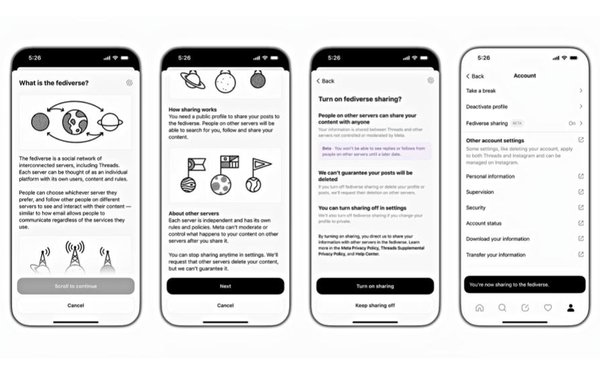
In Meta’s continued
effort to build out its own decentralized social media network, the company’s Bluesky and X competitor, Threads, is further integrating into the fediverse – a hub of
federated social networks hosted on the ActivityPub protocol.
On Tuesday, Threads users who toggle on fediverse sharing will be able to see posts from users they
follow on ActivityPub federated apps like Mastodon, Bookwyrm, and WriteFreely within a dedicated feed.
Meta
says that this will help Threads users attract and seek out a range of views and responses regarding posted content and comments. Content surfaced in the dedicated fediverse feed will appear in
reverse chronological order, Meta adds, “with the newest posts from profiles you follow coming first.”
advertisement
advertisement
Threads users will now also be able to
search for users on federated apps: “For example, you can search for a WordPress blogger’s federated profile and interact with their posts right in Threads.”
Meta says that Threads has interacted with over 75% of all fediverse servers since launching sharing functionality to the fediverse last
year. More recently, in June, Threads sharing expanded globally, but not in the European Region due to regulatory concerns.
With over 350 million monthly active users, Threads is on track to become Meta’s next major platform. Recently, the company also added Threads Feed ads to its Marketing API, allowing
third-party platforms to create ads on network.
Calling Threads “decentralized,” however, is
debated among current tech leaders.
While the platform is technically built on an open-source protocol, it
is still controlled by Meta and connected directly to Instagram, a closed social network. Whereas competing apps like Bluesky are built on a protocol that aren’t controlled by billionaire CEOs
like Mark Zuckerberg, and are promoting the creation of apps that allow users to easily move in and out of with the same digital identity.
The company has yet to fully integrate with the fediverse, which would mean allowing users to move their accounts elsewhere if they disagreed with Meta’s policies.